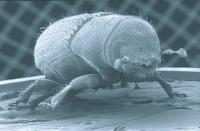To understand just how complex, scary and immediate climate change is, look no further than the case of the tiny mountain pine beetle.
Populations of this tree-eating insect have exploded over the last ten years due to warmer winters, devastating the majestic forests of western Canada and destroying over $20 billion in timber.
Now comes a frightening study published in the prestigious journal Nature that that the huge swaths of dead trees killed by the beetles are themselves emitting enormous quantities of carbon into the atmosphere as they decompose – further exacerbating our climate problems.
How much carbon? By altering the climate in western Canada, we have un-leased a chain of events that will release of close to one billion tonnes of carbon dioxide into the atmosphere by 2020. This is more than five times as much as the annual emissions from all forms of transportation in Canada.
Dr. Werner Kurz of Natural Resources Canada has been researching the devastating impacts of the mountain pine beetle for many years. He says BC infestation is “unprecedented in scale and severity” and at least ten times as large as any outbreak on record.
This rice-sized insect is endemic to western Canadian evergreen forests and makes its living by burrowing into pine trees and eating the soft tissue beneath the bark. Too many beetles can overwhelm a healthy tree and kill it.
For thousands of years none of this was a particular problem. Beetle populations were kept in check by Canadian winter frosts that reliably plummeted below minus 40. Trees and forests lived in chilly equilibrium .
Enter climate change. It has been over a decade since winters have been cold enough to significantly knock back the beetles and their numbers have exploded. Over 130,000 square kilometers of pine forests have been devastated – an area the size of Greece
This epidemic has clobbered the economy of the province, which remains highly dependent on the forest industry. More than 25,000 forest dependant families will be impacted for the next 80 years. Over $100 million of public money has been spent trying to control the spread of the beetle, but all experts agree that the only hope is colder winters.
Instead, it appears that the only thing that will end the beetle epidemic in BC is that they will have no more live trees to eat – something Dr. Kurz believes will come to pass within the next few years.
That will not be the end of our beetle woes however. Having almost exhausted their indigenous food supply, they have already crossed the Rocky Mountains into new habitat and now threaten Canada’s entire boreal forest – one of the most important carbon storehouses on the planet.
“I don’t want to be alarmist but it is certainly feasible that a future outbreak later this century could go right across the the boreal”, said Kurz. If the same cycle of devastation and carbon release occurs, we will be looking at much bigger eventual release of carbon dioxide than one billion tonnes.
Dr.. Kurz’s research demonstrates the dangerous complexities of playing with the thermostat of the planet. This new source of atmospheric carbon from by decomposing trees is an excellent example of what scientists pedantically call “positive feedback loops ”.
The rest of us might better describe these unplanned accelerations of climate change as the “holy crap factor ”. Besides pine beetles killing forests that later decompose, here are some other “holy crap” scenarios we can expect from global warming in the near future:
– Melting sea ice causes less sunlight to be reflected into space, further heating artic oceans.
– Melting permafrost in the artic releases massive quantities of CO2 from decomposing muskeg.
– Melting tundra also releases large amounts of methane – twenty-five times as powerful a greenhouse gas as CO2.
It’s becoming clear that we really don’t have a good handle on how this planet works. Before we twist any more dials, maybe we should sit down and read the owner’s manual. If we did, I suspect we would find a warning in the first few pages that read: “DANGER – DO NOT OVERLOAD THE ATMOSPHERE WITH CARBON DIOXIDE!”
Many more nasty surprises like the pine beetle lie in store for us as we continue our uncontrolled experiment with the plant’s atmosphere, and we ignore these milestones at our peril.
Subscribe to our newsletter
Stay up to date with DeSmog news and alerts







